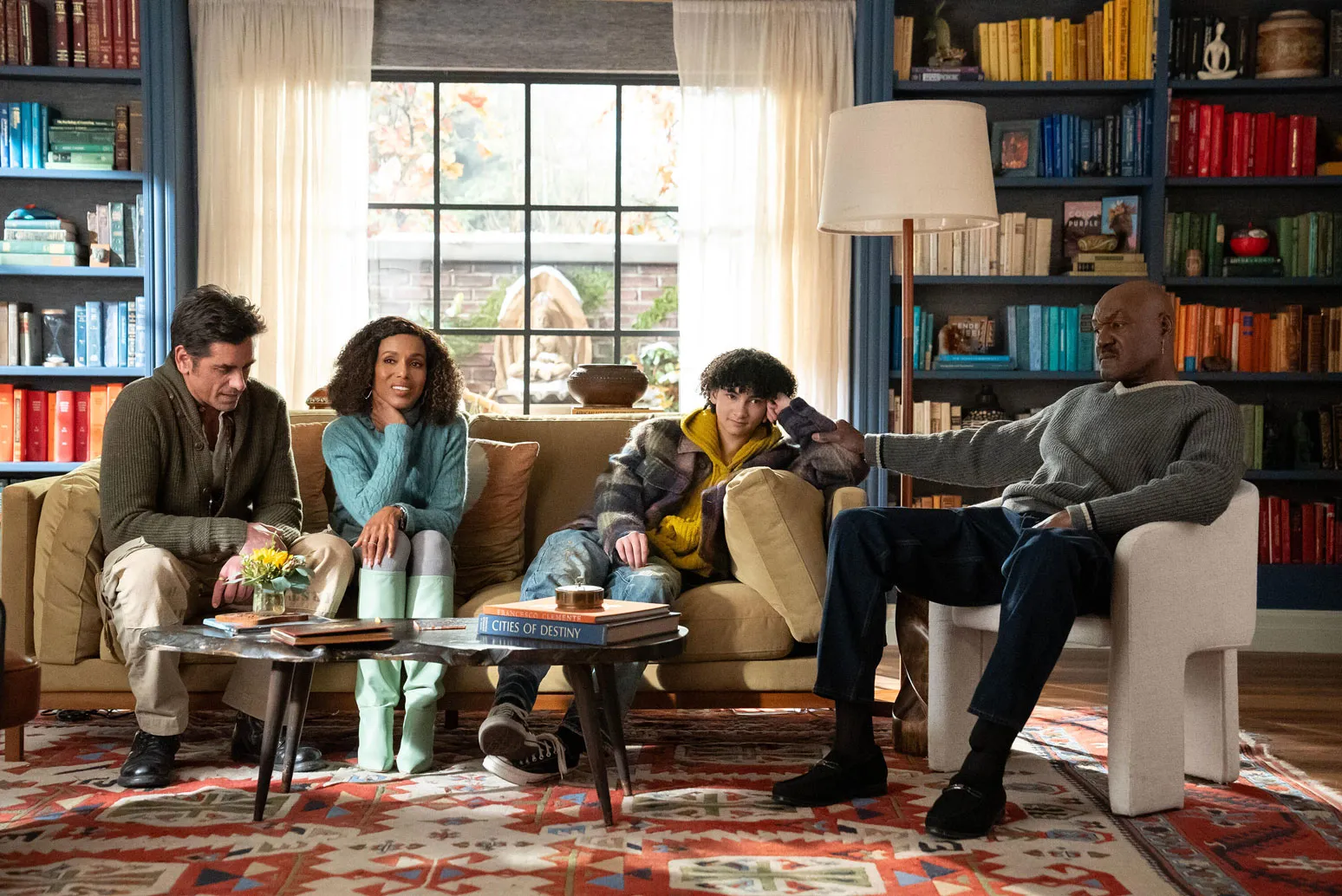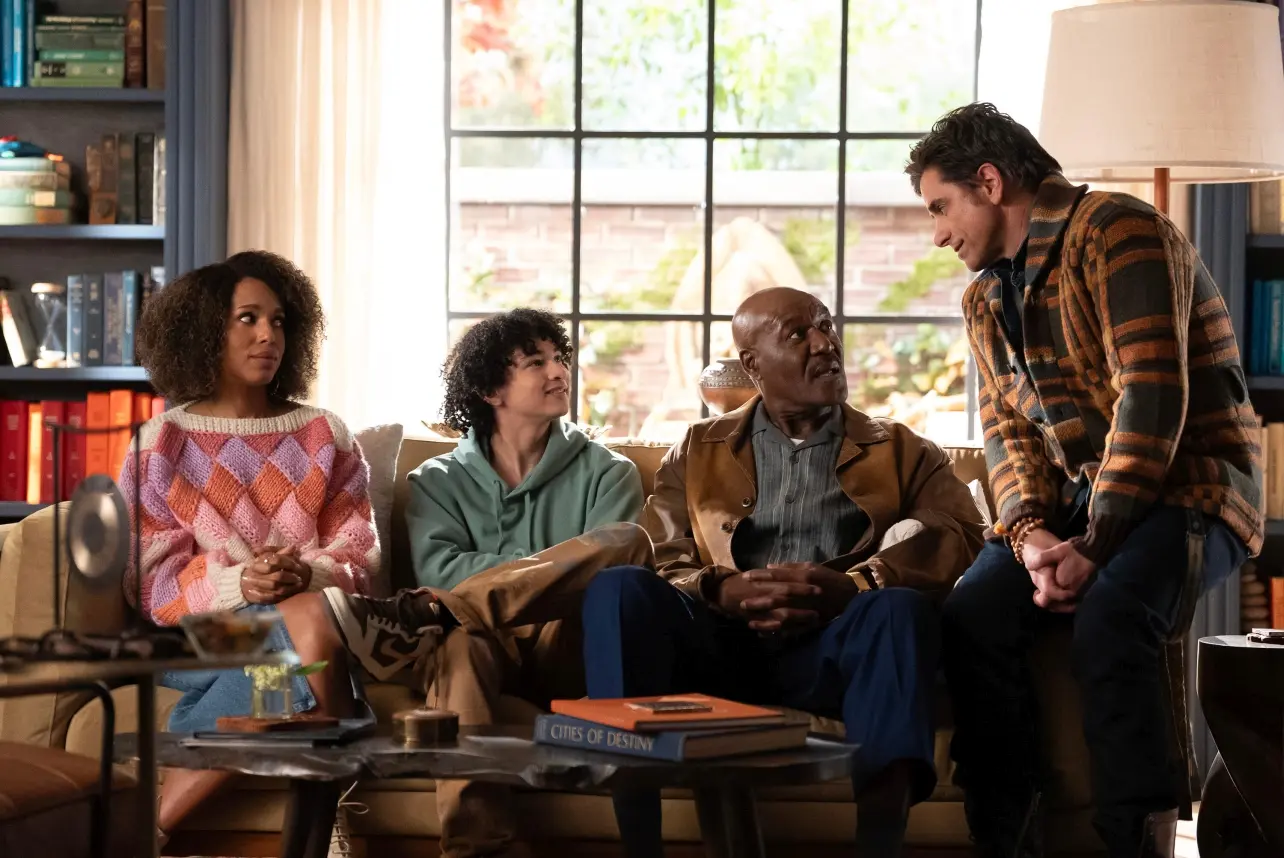The second season of UnPrisoned finds Paige, Edwin, and Finn still navigating their family dynamics in the aftermath of Edwin’s time in prison. Creator Tracy McMillan draws from her own experiences in crafting this moving portrait of a family striving to reconnect despite past mistakes and traumas.
Paige is a therapist who helps others while struggling to manage her own anxieties. Viewers see her vulnerable side through Kerry Washington’s nuanced performance. Edwin, too, is coping with his return to the outside, played brilliantly by Delroy Lindo. Their young son Finn deals with his own pressures, as portrayed with insight by Faly Rakotohavana.
This season sees the family reconnect while seeking counseling from an eccentric new therapist, John Stamos. His unorthodox methods create humor but also drive home challenging truths. Through it all, the heart of the show remains Paige, Edwin, and Finn’s commitment to healing old wounds together. Their dynamic, anchored by three powerhouse performances, makes UnPrisoned engaging viewing as relationships evolve amidst life’s difficulties.
Returning to UnPrisoned
Kerry Washington and Delroy Lindo are the heart and soul of this show. As Paige and Edwin, they shine in every scene, whether sparring or supporting one another. Washington breathes vibrant life into Paige, making us fully understand her anxieties and see past her defenses.
Her comedic timing steals many laughs too; the way she responds to unexpected situations feels refreshing and real. Lindo matches her perfectly, imbuing Edwin with charm and vulnerability. He’s a man striving to do better while haunted by past mistakes. Together, their easy chemistry anchors the series, and it’s plain to see why they remain the focus.
Yet this is very much an ensemble effort. Faly Rakotohavana is a standout as Finn, Paige’s perceptive teen son. He carries complex emotions with aplomb, ensuring Finn feels like a fully formed person rather than just part of someone else’s story. John Stamos is a blast too as their unconventional therapist. He adds just the right amount of zany humor, keeping things lively while also helping the characters realize difficult truths.
Supporting players like Jee Young Han and Marque Richardson brings further depth. Richardson in particular shines this season, with his character becoming more fleshed out. Even bit parts, from Nadine to Edwin’s old friends, are crafted with care. This supporting cast brings the world of the show to vibrant life.
Through it all, humor and heartbreak live in perfect balance, thanks to talents like these. From minor moments to major milestones, performers deliver every line and scene with passion. UnPrisoned remains compelling exactly because of how completely it draws us into its characters’ lives.
Finding Balance
UnPrisoned has a real knack for mixing things up. It tackles heavy stuff like incarceration and its lasting effects. Yet the show is frankly hilarious too. How does it pull that off so seamlessly?
Part of it is format. Those therapy scenes are comedy gold, especially with John Stamos’ character. But they also let characters hash out real issues each week. The show gets really inventive too, like visualizing trauma through an over-the-top wrestling match. It’s loads of fun while tapping into deeper emotions.
Something about the therapy setup gives writers freedom. They can flit between serious reflections and silly jokes without missing a beat. Of course, the cast sells every line perfectly, whether they are crying or cracking up. But I think the structure lends itself to balance.
There’s also a lighter touch this season. Season one dealt heavily with systemic racism and its consequences. This time, personal struggles take precedence. That allows room for more character-driven humor while still honoring the heavier themes underneath.
Ultimately, it comes down to trusting the audience. The show knows we can handle swings from laughter to tears. It respects our intelligence too, never dumbing down or over-explaining its points. As long as the characters feel real, we’ll follow wherever the story leads—even if the tone changes mid-scene.
Maybe that’s why this season feels more assured. Unprisoned has found confidence in its own voice and vision. By loosening up some, it lets moments of wit and joy shine through stronger. The show understands that balancing life’s darkness with its delight is what really reflects the human experience anyway. In finding that rhythm, it hits all the right notes.
Finding Their Way Back to Each Other
Family means everything in UnPrisoned. At the heart of it all are Paige and Edwin, a daughter and father trying to rebuild what was broken. Incarceration tore them apart for so long, it’s no wonder reconnecting is far from easy.
We see how prison scars in more ways than the obvious. It leaves people carrying burdens they never asked for. Edwin wrestles with his past mistakes, while Paige battles lingering fears of abandonment. Their issues run deep, and healing won’t happen overnight.
That’s where those therapy sessions come in. Sure, the back-and-forth is laugh-out-loud funny. But it serves a purpose too. Week by week, the sessions unpack painful layers and shed light on new perspectives. It gives Edwin, Paige, and Finn a space to openly discuss what weighs on them.
And little by little, you see the impact. Their bond strengthens as old wounds find care. Paige learns to loosen up and see beyond her defenses. Edwin owns his role while caring for those he left behind. Even Finn chips in, sharing teenage wisdom beyond his years at times.
Change doesn’t always look pretty, either. Two steps forward sometimes mean one step back. The family unit faces bumps as comfort zones shift. Yet through it all shines their desire to make things work this time around.
In the end, what else really matters but family? UnPrisoned gets that warmth in its storytelling. It honors the messy realities of simply being human, and human beings learn as they go.
Of course, bigger societal issues still play a part too. The shadow of systemic racism lingers as an underlying theme. But never is it presented as something for characters to merely overcome. Instead, it’s acknowledged as being woven into the fabric of their world. Part of accepting life’s complications as they are, not how we wish them to be,.
With empathy and humor, UnPrisoned walks with this family. And it reminds us that healing is a journey, not some neat destination. Life may surprise with all its imperfect beauty, but facing it together is what really makes all the difference.
Depth Beyond the Surface
UnPrisoned excels at crafting vivid, multidimensional characters you truly invest in. Paige, Edwin, and Finn feel like real people, not just roles to fulfill. Small moments reveal their humanity, like Edwin opening up to that chance encounter. You understand pressures from their past, which shapes who they are, while futures remain unwritten.
This depth stems from two phenomenal lead performances. Kerry Washington breathes incredible authenticity into Paige. Subtle expressions convey complexity within, from anxiety to resiliency. Delroy Lindo equally shines through restraint, exuding Edwin’s charm and vulnerability. Their energy and dynamic carry each scene.
Thanks to this, relationships take center stage genuinely. Family bonds form the heart, evolving believably after ups and downs. Past traumas feel addressed, not exploited. Therapist scenes prove cathartic and earnest, not merely gimmicky plot devices. Even side characters feel fully formed by their own arcs.
Lightness in tone proves no barrier to substance. Humor emerges naturally from real struggles. Emotional beats land powerfully despite their comedy roots. One gets a sense of lives led beyond what’s shown. Stories highlighting resilience and growth feel inspiring without sugarcoating reality’s rough edges.
Of course, not everything locks into place seamlessly. Later episodes have potential loose ends hastily tied up. Developments built for maximum impact sometimes fall a bit flat. Scenes apart from leads occasionally drag the pace.
Yet these feel like minor gripes against overall achievement. UnPrisoned demonstrates television at its best—crafting a world you truly care about. By prioritizing authentic, empathetic storytelling, it taps into something universally relatable. Even with minor stumbles, its heart and humanity shine through.
Maturity Through Experience
Season two of UnPrisoned marks growth from its already-solid premiere outing. Where the focus on systemic challenges gave season one weight, this iteration explores deeper interpersonal terrain. Trauma’s impact can’t be erased, but through openness and effort, lives evolve.
Gone is the impending doom of reincarceration hanging over Edwin. Without lessening racism’s reality, season two magnifies humanity above statistics. Characters feel freer exploring who they wish to become rather than facing who society says they must. Therapy sessions poke fun at easy answers, mirroring life’s complexity.
Shifting to somewhat familiar family dynamics, like Finn seeking his father, doesn’t equal shallowness. These issues feel authentic, untying the show with heavy-handed social commentary alone. Messier details like Edwin’s charm and Paige’s anxiety spring to life. Their bond, once fractured, strengthens through candor and compromise.
Even when chasing predictable beats, UnPrisoned’s heart remains engaged in thoughtful performances. Washington and Lindo mine humor from pain and lightness from weight. Their talents lift routine material, granting glimpses into resilient souls rebuilding trust.
If season one navigates opening scars, season two celebrates green shoots emerging. Characters lean on each other rather than keeping a safe distance. Light prevails through shared understanding, not the denial of darkness. Life takes twists, but the community’s power to heal shines through.
UnPrisoned’s sophomore run shows a series embracing nuance over simplification. By trusting audiences and their characters, storytelling deepens. These flawed yet persevering individuals feel real, precisely because of bumps along their road. Their journey honors resilience through connection, not stigma or isolation. In trusting life’s messiness, the show finds its voice.
UnPrisoned Continues to Imprison Hearts
This family really draws you in, doesn’t it? Watching their struggles just feels intimate. Lindo and Washington make you care so deeply about Edwin and Paige. And scenes between Finn, Esti, and the others swell your heart too.
It’s clear this show knows pain but refuses to wallow. Trauma darkens their days, yet resilience brightens what follows. Characters lean on one another rather than isolate themselves. Their bond strengthens through candid talk and compromise, not denial.
UnPrisoned explores tough topics with empathy, wit, and heart. It finds humanity even in hardship and laughter amid difficulties. Doesn’t pull punches depicting racism’s effects, but refuses to reduce characters to statistics. They feel fully formed, flaws and all.
This moving portrait leaves you hopeful. If these three can rebuild trust after such damage, maybe healing exists for many wounded families. Their interconnected lives show communal care can outshine past wrongs.
With layered performances and grounded themes, UnPrisoned deserves viewers. It doesn’t claim pat answers, yet it affirms life’s beauty through community. Season two proves this story is just getting started. I can’t wait to join this family again and share in their growth. Their imprisoned hearts now set this show free to soar.
The Review
UnPrisoned Season 2
UnPrisoned is a thoughtful drama that explores generational trauma with empathy, care, and wit. Kerry Washington and Delroy Lindo deliver superb performances that anchor this moving portrait of a family strengthening bonds despite difficulties. While not perfect, season two proves the series is maturing into an even more assured, nuanced take on resilience through community.
PROS
- Strong central performances from Kerry Washington and Delroy Lindo
- Thoughtful and moving exploration of family, trauma, and growth
- Achieves a balance of humor and drama with empathy and insight.
- Visualizes therapeutic concepts in creative and engaging ways.
- Examines the impacts of racism and incarceration with care and honesty.
CONS
- Some plot developments towards the end feel a bit rushed or undercooked.
- Secondary characters could be even more fully developed.
- The risks of formulaic setup lessen the urgency of systemic issues in S1.
- Paige's therapy practice is not wholly convincing.




















































Discussion about this post